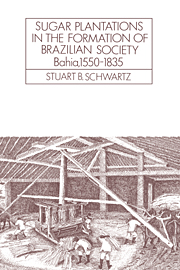Book contents
- Frontmatter
- Contents
- List of figures, maps, and tables
- Preface
- Abbreviations and special terms
- Weights and measures
- Dedication
- Part I Formations, 1500–1600
- Part II The Bahian engenhos and their world
- Part III Sugar society
- 9 A colonial slave society
- 10 The planters: masters of men and cane
- 11 The cane farmers
- 12 Wage workers in a slave economy
- 13 The Bahian slave population
- 14 The slave family and the limitations of slavery
- Part IV Reorientation and persistence, 1750–1835
- Appendixes
- Notes
- Glossary
- Sources and selected bibliography
- Sources of figures
- Index
- CAMBRIDGE LATIN AMERICAN STUDIES IN PRINT
9 - A colonial slave society
Published online by Cambridge University Press: 05 May 2010
- Frontmatter
- Contents
- List of figures, maps, and tables
- Preface
- Abbreviations and special terms
- Weights and measures
- Dedication
- Part I Formations, 1500–1600
- Part II The Bahian engenhos and their world
- Part III Sugar society
- 9 A colonial slave society
- 10 The planters: masters of men and cane
- 11 The cane farmers
- 12 Wage workers in a slave economy
- 13 The Bahian slave population
- 14 The slave family and the limitations of slavery
- Part IV Reorientation and persistence, 1750–1835
- Appendixes
- Notes
- Glossary
- Sources and selected bibliography
- Sources of figures
- Index
- CAMBRIDGE LATIN AMERICAN STUDIES IN PRINT
Summary
In America every white man is a gentleman.
Alexander von Humboldt (1804)… where a person of the most humble birth puts on the airs of a great gentleman.
A royal official (1718)Up to this point, we have traced the formation of colonial Brazilian society through the sugar economy and the plantation system on which it was based. During this formative experience, actions and decisions by Europeans, Indians, and Africans contributed to the way in which the historical process took place and the results to which it led. Moreover, the technology and techniques of sugar production and its position within an international market also structured relationships within the society and created or reinforced positions held by various groups: planters, merchants, and slaves. Although from the beginning there were always other groups and other activities in Portuguese Brazil, sugar, the engenho, and slavery played central roles in defining and shaping Brazilian society. They did so not only because sugar remained an important economic activity but also because the principles on which sugar society was grounded were widely shared, adaptive to new situations, and sanctioned by both church and state. Colonial Brazil was a slave society not simply in the obvious fact that its labor force was predominantly slave but rather in the juridical distinction between slave and free, in principles of hierarchy based on slavery and race, in the seigneurial attitudes of masters, and in the deference of social inferiors.
- Type
- Chapter
- Information
- Sugar Plantations in the Formation of Brazilian SocietyBahia, 1550–1835, pp. 245 - 263Publisher: Cambridge University PressPrint publication year: 1986



